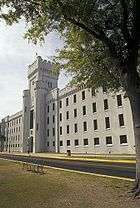South Carolina State Arsenal
The South Carolina State Arsenal ("The Old Citadel") in Charleston, South Carolina was built in 1829 after the 1822 slave revolt led by Denmark Vesey.[2] In 1842 the South Carolina Military Academy, a liberal arts military college, was established by the state legislature, and the school took over the arsenal the following year as one of 2 campuses, the other being the Arsenal Academy in Columbia, South Carolina. The school became known as the Citadel Academy because of the appearance of its building. From 1865 to 1881, during Reconstruction, Federal troops occupied the Citadel, and the school was closed. Classes resumed in 1882 and continued in this building until the school was relocated to a new campus on the banks of the Ashley River in 1922.
South Carolina State Arsenal | |
.jpg) | |
  | |
| Location | 337 Meeting St., Charleston, South Carolina |
|---|---|
| Coordinates | 32°47′14″N 79°56′11″W |
| Built | 1829 |
| Architect | Frederick Wesner and Edward B. White |
| NRHP reference No. | 70000577[1] |
| Added to NRHP | July 16, 1970 |
| Wikimedia Commons has media related to South Carolina State Arsenal. |
Frederick Wesner and Edward Brickell White are credited with the Citadel's design. The original State Arsenal building was a two-story brick building around a courtyard, designed by Wesner. White was responsible for changes to the building about 1850, and added the third floor and wings.[3] A fourth floor was added in 1910.
Charleston County used the building for government offices during much of the 20th century. In 1994 a local development firm renovated the building for use as a hotel.
References
- "National Register Information System". National Register of Historic Places. National Park Service. July 9, 2010.
- W.H.J. Thomas (March 19, 1971). "Architecture Follows Old Citadel Style". Charleston News & Courier. p. 24. Retrieved Nov 28, 2012.
- "South Carolina State Arsenal, Charleston County (2 Tobacco St., Marion Square, Charleston)". National Register Properties in South Carolina. South Carolina Department of Archives and History. Retrieved Nov 28, 2012.


